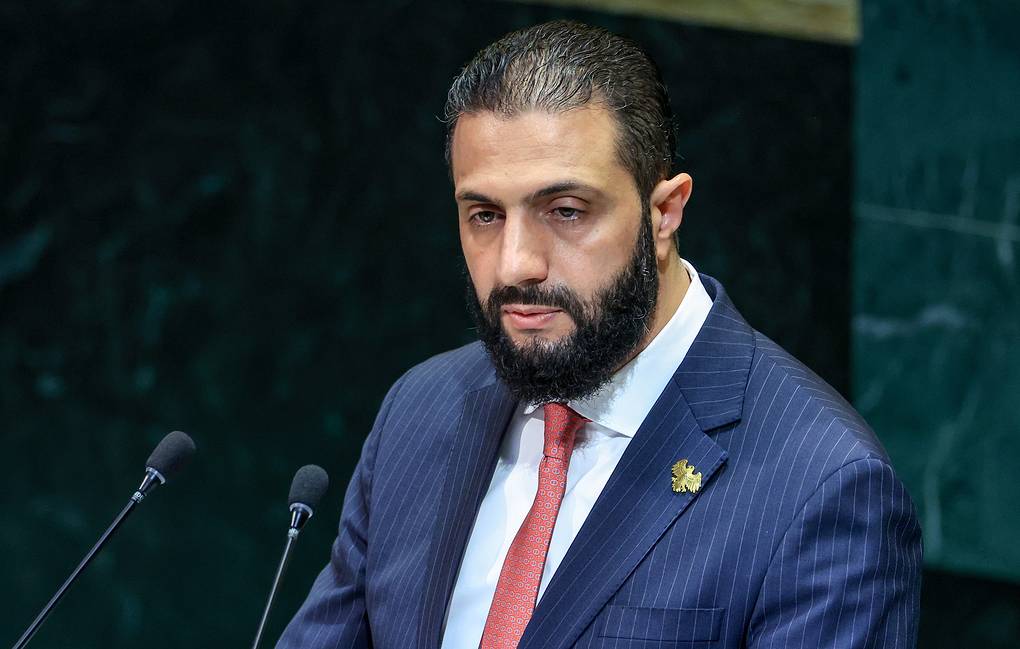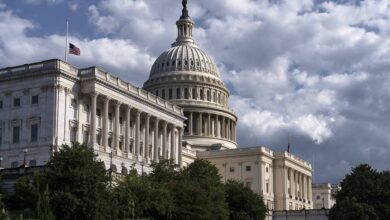Press review: Syrian interim president visits US and Denmark pumps $6 bln into Arctic arms
Top stories from the Russian press on Monday, November 10th Syria’s President Ahmed al-Sharaa
Syria’s President Ahmed al-Sharaa
MOSCOW, November 10. /TASS/. Arab countries rejected the US’ "New Gaza" plan, Syria’s interim president paid his first visit to the US, and Denmark purchased weapons to broaden its presence in the Arctic. These stories topped Monday's headlines across Russia.
Vedomosti: Why Arabs rejected US plan on 'New Gaza'
Arab countries have not backed the US’ proposal on reconstructing the Gaza Strip only in areas controlled by Israel, the Financial Times (FT) reported, citing anonymous Arab diplomats.
The newspaper’s sources are concerned that such a plan is fraught with a long-term division of the Palestinian enclave. Therefore, potential financial backers so far merely plan to provide funds for the Strip’s partial rebuilding and focus on humanitarian aid for the areas held by the Israeli army.
Boris Dolgov, leading researcher with the Center for Arab and Islamic Studies at the Russian Academy of Sciences’ Institute of Oriental Studies, has not ruled out the possibility of the US’ initiative on Gaza being implemented. According to him, in theory, wealthy Arab monarchies are ready to invest in the enclave if the US and Israel ensure stability in the region and offer them beneficial financial and economic projects on other tracks to compensate for these expenses.
Potentially, Arab countries may also participate in rebuilding the territory controlled by Hamas, Dolgov added. "However, it all depends on the Islamists’ readiness to disarm. It is possible that under pressure from the US and Arab countries, Hamas will agree to concessions if this does not imply the end of the Palestinian movement," the expert explained.
In theory, any country or international organization may get involved in reconstructing Gaza, as there are no legal barriers to doing so, political scientist Kamran Gasanov said. Another issue is that the Palestinians’ access to humanitarian aid is restricted either by unsafe conditions or by physical barriers imposed by Israel. "No doubt that Turkey and the wealthy monarchies of the Persian Gulf are most interested in normalizing peaceful life in Gaza. But Arab countries do not want to rebuild the territories held by Israel only to see Gaza follow the same path as the occupied West Bank. And the proper conditions on the ground have not yet been established either," the expert noted.
Izvestia: Syrian interim president makes first visit to US
During the visit of Syrian interim President Ahmed al-Sharaa to Washington, that country may sign an agreement in the United States to join the international coalition against the Islamic State organization (IS, recognized as terrorist and outlawed in Russia). This will be a significant diplomatic move and bolster the position of the current Syrian authorities, experts believe. In addition, the United States is weighing the possibility of deploying its military contingent in that country. Plans for Damascus to join the coalition are worrying for the Kurdish forces — they fear "betrayal" from Washington after many years of joint struggle against IS. At the same time, Damascus is showing interest in expanding cooperation with Moscow.
According to Eastern Studies expert Kirill Semyonov, al-Sharaa's invitation to Washington is connected not only to the discussion of a possible Syrian-Israeli settlement, but also with the US' concern over the growing Russian-Syrian contacts.
"Washington is closely monitoring how actively dialogue between Moscow and Damascus is developing, and they are concerned over the strengthening of Russian influence in Syria," the expert noted.
According to him, the Donald Trump administration is likely to urge the interim president to limit interaction with Moscow. The expert believes that the United States is seeking to curb Russian-Syrian cooperation and is already taking obstructive actions, supporting the anti-Russian agenda in Syria. Semyonov noted that pressure on al-Sharaa increased right after his visit to Moscow.
Izvestia: Denmark spends $6 billion on weapons for Arctic
Denmark has spent $6 billion for arms purchases to boost its presence in the Arctic, Russian Ambassador to Copenhagen Vladimir Barbin told Izvestia. According to him, the Danish authorities are militarizing Greenland under pressure from the United States. Such actions "contradict the goals of preserving the Arctic as a zone of stability," the diplomat noted. At the same time, American officials have repeatedly stressed the importance of Greenland, and Trump even mentioned the possibility of buying the island. Experts are confident that NATO will continue its expansion in the region.
By urging Denmark to strengthen its presence in the Arctic, the United States is mainly pursuing commercial and only then geopolitical interests, Nikita Lipunov, junior research fellow at the Institute of International Studies at MGIMO University, told Izvestia.
According to him, since his first presidential term, Trump has consistently and systematically raised the issue of increasing defense spending with NATO allies. That said, the US president even suggested the idea of leaving the bloc. At the same time, Washington's ambitions regarding Greenland have not disappeared.
At present, the Greenland issue has moved into the background for Trump, Konstantin Sukhoverkhov, program manager at the Russian International Affairs Council, said in a conversation with Izvestia.
"The Greenland issue has just temporarily fallen out of Washington's current agenda, because now resolving conflicts in Gaza and Ukraine is more important. In addition, the United States is conducting trade talks with China, and we see the continued introduction of tariffs, including on Washington's partners. Right now, Trump and his administration truly have more urgent issues than talks on Greenland," the expert stated.
That said, the island itself remains significant to Washington. Control over Alaska makes the United States an Arctic power, but this state itself is quite problematic in terms of potential development, Sukhoverkhov noted. The difficult terrain makes it much harder to build infrastructure there. This is also impeded by the limited icebreaking fleet compared with that of Russia. Greenland is much more convenient for the United States in this sense, the expert added.
The growth of NATO infrastructure should also be expected in the Arctic region, said Andrey Koshkin, head of the Department of Political Analysis and Socio-Psychological Processes at the Plekhanov Russian University of Economics. At the moment, seven of the eight Arctic states are members of the North Atlantic Alliance, and all of them will seek to push Russia out of the region.
"Denmark inviting NATO to the Arctic increases the risk of conflict in the region. This development is especially dangerous given the lack of dialogue between our countries on military and political issues and Denmark's unwillingness to renew constructive international cooperation in the Arctic with Russia's participation," said Barbin.
Today, Western countries view Russia as a constant threat, especially in such strategically important areas as the Arctic, Koshkin emphasized, since there the interests of the collective West and the Russian Federation intersect.
The region is especially significant because, due to the melting of ice, it could become a year-round route from China to Europe, Leonid Markovich, head of the HSE Department of World Economy, explained in a conversation with Izvestia. The Arctic also holds a large number of valuable resources.
Nezavisimaya Gazeta: Russia to increase mining for rare-earth metals
By December, the Russian government will approve a roadmap for a long-term development of extracting and producing rare and rare-earth metals, as instructed by President Vladimir Putin.
Russia is second worldwide on rare-earths supplies. However, their mining in the country is under 1%, while their processing is almost non-existent. The lion’s share of the rare-earths necessary for domestic enterprises is imported, with China being the main supplier. Russian officials hope to reduce Russia’s dependence on imported raw materials by 2030 and increase the extraction of rare-earths from the current 2,000 tons to 50,000 tons per year. Experts note that China has ensured its current leadership by decades of large-scale investments and major labor input, along with looser environmental norms.
The experts believe that Russia’s main issue is the lack of the necessary technologies and demand. Academician Nikolay Bortnikov of the Russian Academy of Sciences highlighted the fact that with the mining for rare-earth ore, metals are frequently not extracted but are merely stored in a tailing dump. "The problem is that we, unfortunately, today have no capacity to separate rare-earth metals in our country. This group includes 17 metals. They must be extracted from the collective concentrate. But this extraction can be done only at an enterprise that was built during Soviet times and now is located in Estonian territory," the scientist said.
Professor of the Financial University Ivan Petrov has suggested that Russia focus on the projects which can yield results within five years. "First of all, it is necessary to lessen dependence on rare-earths imports by developing Russian technologies for separating complex ores with extracting rare-earth elements. The implementation of such projects is possible with the creation of a long-term system of investment support and tax incentives on the part of the state," he believes. And, given trade wars between China and the US and the risks of sanctions imposed on Russia’s successful investment projects, it is also necessary to plan the development of this industrial branch with the participation of BRICS, SCO and EAEU partner countries, the expert added.
"The development of the rare-earth industry in Russia faces a number of challenges, including the need to modernize infrastructure, limited access to hi-tech equipment and tough competition with China. In order to overcome these difficulties, Russia will have to approve and implement a comprehensive roadmap based on China’s experience while it will be necessary to create its own technology chains and strategic partnerships," believes Tsifra Broker analyst Dmitry Vishnevsky.
Kommersant: Prices for Russian coal soar on Western markets
Demand for Russian steam coal has started to rise in the West, especially in Turkey, where utility companies are accumulating reserves. Analysts say that the Turkish market is currently the most promising for Russian coal producers, pointing to the expected increase in consumption in that country. Meanwhile, in China, the active surge in prices has eased.
According to Sergey Kazachkov of Kept, so far, only the Turkish direction appears promising for the Russian coal industry, where the observed growth in supplies is supported by favorable forecasts about the need to boost consumption. According to Turkish data, over January-August, Turkey increased coal imports from Russia by 34% year-on-year, to 21.3 million tons.
Nariman Taketayev, director for corporate ratings at NKR agency, expects that China, India, Turkey and South Korea will remain the main importers of Russian coal until the end of this year.
However, Kirill Lysenko, a sovereign and regional rating analyst at Expert RA, noted that Australia, being South Korea’s traditional coal supplier, has increased its activity on that market, while working with India is complicated by costly logistics, the high elasticity of demand and intense competition.

